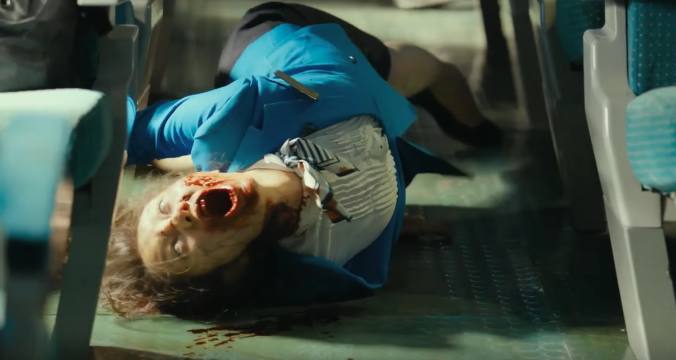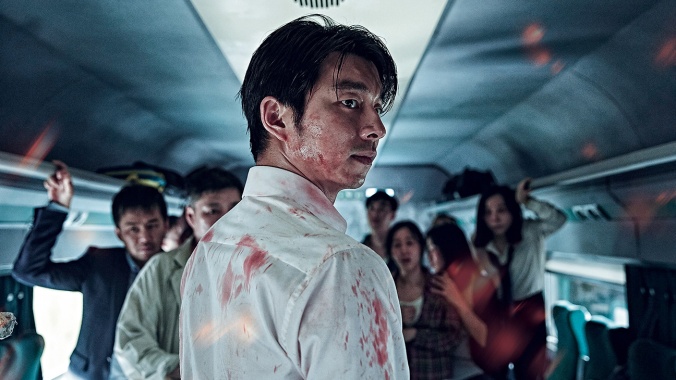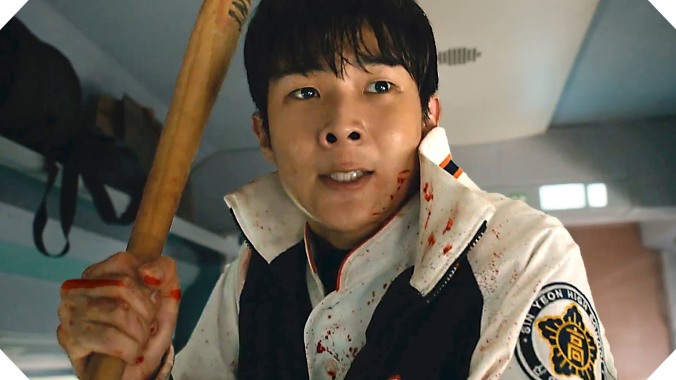
In early Korea, a corrupt political clan rules the land and controls the king like a puppet—check. A dashing prince attempts to overthrow them and win the hearts of the people—check. Swords clanging, arrows swooshing, and gunpowder exploding every episode—check. Oh, and did we mention hordes and hordes of grotesque, flesh-eating zombies? Combine all of these and you get Kingdom, 2019’s surprise hit from Netflix.
The Beardict: Kingdom is that type of show which friends recommend to you, and you’re like “Okay, I’ll watch it if you say so.” And then when you get to finally watch it, you’re like “Woah. I need to recommend this to as many friends as possible because I have feelings.” In that moment, a cult following is born. To be fair, Kingdom deserves such loyalty, with an intensity that doesn’t subside until the ending credits of the 6th episode roll out. It’s a fresh take on a mostly Western-dominated zombie genre.
Here’s a list of why Kingdom was so successful in captivating audiences:
WARNING: SPOILERS AHEAD

The blending of K-drama, zombie, and period drama works. As far as I know, promotions-wise, Netflix isn’t pushing Kingdom as much as its other newly-released titles like The Umbrella Academy. However, I do see a similar number of people posting about it on my social media feed, generating interest from word-of-mouth reviews. The backbone of its success seems to be the intersection of different genres that have solid fanbases. If you’re a fan of K-drama, the show’s concept alone can get you hooked. If you’re a zombie fan, then you’d be curious to know how the zombies are in the series. Finally, if you’re a fan of shows set in the past, then you’d be excited about how a zombie outbreak would devastate the Joseon dynasty during the 17th century.

Spreading of epidemic is unique. Most of the time, pop culture shows that the start of a zombie outbreak is a result of a failed medical experiment (an effort to make the ultimate soldier, etc.). Franchises like Resident Evil and 28 Days Later (and to a certain extent Train to Busan) fall under this category. However, there are times when there’s no explanation given at all and zombies just appear out of nowhere, like in Dawn of the Dead and The Walking Dead. In Kingdom, not only does it start off with an attempt to resurrect a dead body, but it also spreads not through a bite, but through one of the most unnerving ways possible: ingestion of an infected corpse. The moment Seobi realized that the patients at the clinic were happily eating the dead assistant of the doctor (that severed thumb plopping from the soup is a certified Sweeney Todd moment, by the way), my skin crawled. It’s a lot to take in since it’s cannibalism and zombie outbreak in one swift motion. Wow.
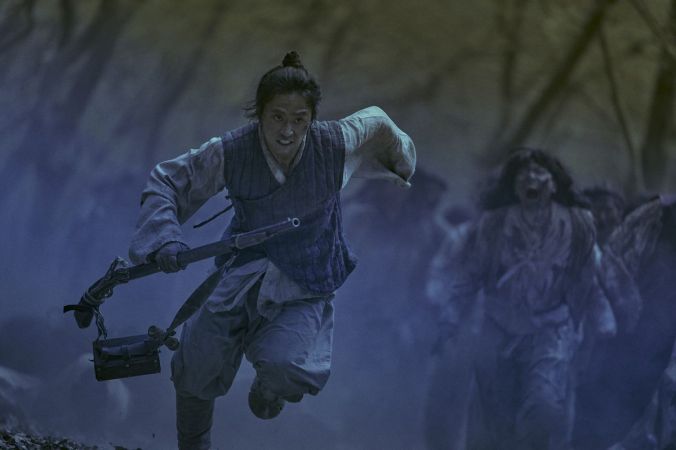
The terror is put to the extreme, and the helplessness is so real. What makes Kingdom so terrifying is that it’s set in the olden days– modern technology is simply not available. Instead of guns, they have swords and arrows. Headshots are almost impossible, and beheading is the go-to kill move, and you have to be quite skilled and close to pull it off. Thankfully, the afflicted have several weaknesses, such as fire, water, and sunli—Oh, right. Haha. Nevermind that last part. Instead of cars, they have horses and wagons. That wagon-gate scene when they were passing through the forest was extremely stressful, so much so that it caused us, the audience, to break a sweat ourselves.
Intro is an educational experience. When we watch shows, we tend to take the intro music for granted. Although artistic, it’s usually abstract and doesn’t really tell much about the story. However, Kingdom takes a more proactive approach and reminds us over and over again at the start of each episode how the King was originally infected—the process is right there for us to see! In fact, we find out that the resurrection plant was used on the King even before Prince Chang does.
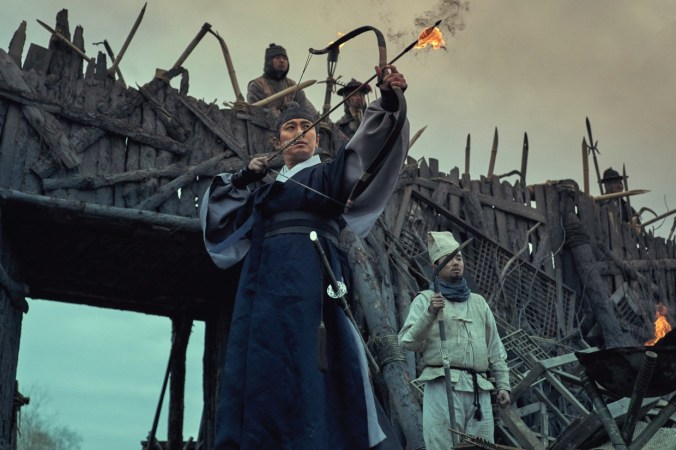
Prince Lee Chang (Ji-Hoon Ju) is a likable protagonist. Brave and perceptive, he tries to do what he can to save the kingdom even though the stacks are against them. He’s someone who can rally troops (even if accused of treason). Despite all of this, he has a long way to go in becoming the true leader of the people. His arrogance and elitist views sometimes still get in the way, and loyal royal guard Muyeong is there to nudge him along during bouts of hesitation. It’s interesting to see how he will avenge all the scholars who died so he could live.
Romance takes a backseat in Kingdom, making it a unique K-drama hit. Although popular K-dramas such as Descendants of the Sun (2016) and Black (2017) have exciting plots, the developing relationship between the leads is still one of the main drivers of their stories. In Kingdom, our hero Prince Chang is not romantically-linked to any character, and is just dead set on solving the zombie epidemic plaguing the country. Actually, the only “courtship” that happens in the show is between cowardly Magistrate Cho and determined healer Seobi (Doona Bae), and it’s honestly more for comic relief. Because of this, the male demographic more inclined towards action would easily be invested in watching Kingdom.

The length of Season 1, and signs of things to come. A friend said that the only thing wrong with Kingdom is that the first season is too short. Only six episodes with each running for less than an hour, I would have to agree… to a certain extent. I think the fact that it’s just a short series makes it very easy to binge or integrate during your week—Kingdom can either be your lunch break buddy (if you can stomach all the gore while you’re downing your meal) or something you watch right before you go to bed (if it’s cool for you to have zombie-filled nightmares).
Simply put, Kingdom would be Game of Thrones if it happened in Korea. Rather than thinking that its unoriginal, I actually believe that it’s a great way to build the audience. After all, Game of Thrones works for a multitude of reasons. Here are all the similarities (and certain differences) I spotted:

o Chief State Councilor Cho Hak-ju and his children are simply the Lannisters of Kingdom, and they take advantage of a king who does not know how to rule (Robert Baratheon, anyone?). Thankfully, there’s no brother-sister incest happening here. Whew.
o In true Lannister fashion, Cho Hak-ju and the Queen (his daughter) engage in a power struggle, reminiscent of how Tywin and Cersei used to threaten each other. Like Cersei, the Queen is all about the family, but her loyalty is tested time and time again by her father’s words.
o The death of a king triggered a chain of events that led the whole kingdom to disarray (While drunk, Baratheon gets speared by a wild boar, while Prince Chang’s father dies from “illness”).
o We have rabid zombies instead of White Walkers. They seem to be much easier to kill (unless they evolve in the next season). However, the fact that they’re already knocking on doorsteps makes them more urgent. Winter has already come, friends.
o Prince Chang is accused of wanting the throne for himself; his supporters are executed (Ned Stark is accused of usurping the throne; Winterfell pays the price.) Chang also shares a similarity with Jon Snow, since they’re both bastard sons who reluctantly rise to the challenge because the people need them to.

o In both shows, politics is strong, secrets abound, and the rich and powerful prey on the weak. Both provide commentary on how real life is—people with no food are used like fodder to protect the “noblemen” who have more than plenty to eat. Magistrates ally themselves with the ruling family even though they know what’s right. Although Kingdom doesn’t have a Master of Whispers, the truth is still an elusive thing.
o Almost everything bad that can happen happens. The turning point for Prince Chang was when Magistrate Cho left, and he took it upon himself to ensure the people’s safety. He wanted to be different from the traditional politicians, and even had a heartwarming moment with the children he gave slabs of meat to. However, minutes after, the same children died because of arrows meant for him. Ugh, we can’t have nice things anymore—Oberyn’s almost victory-turned-brutal head explosion is still etched in my brain.
o Noticeable differences: – Except for the effect of the resurrection plant, magic is non-existent in Kingdom. There are also no dragons that can swoop down if all else fails. There are fewer factions for now, and the zombies don’t take forever to pose a threat (almost everyone is now aware). All the leads are still alive at the end of this season, but who knows? The spirit of George R. R. Martin’s writing might just invade Season 2.

Given the positive reception, we are almost assured of a Season 2 anyway, and Kingdom desperately needs one because the season ended with a cliffhanger. Now that the zombie epidemic is widely known, we have many questions: How will the living defeat the dead? Is one of our lead characters going to be eaten for breakfast during the attack at Sangju? Will everyone know about the queen’s deception? Who is the spy among the Prince’s merry band of misfits? More importantly, will Seobi and Magistrate Cho live long enough to become a couple? Haha. We hope all of these are answered soon enough! Meanwhile, let’s enjoy our regular, zombie-free lives, and pray that no real outbreak happens anytime soon.
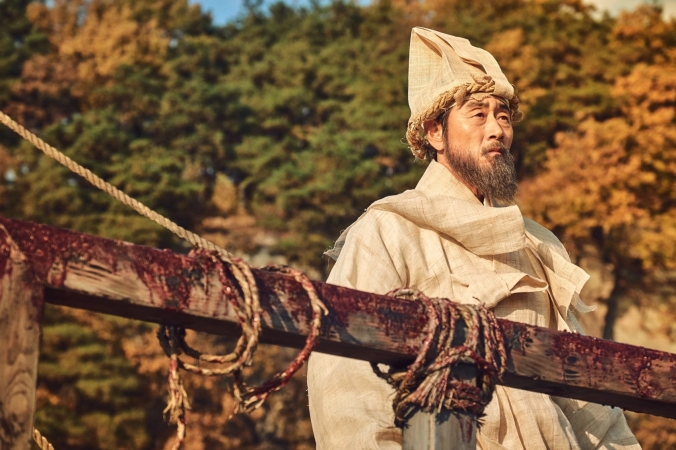
Photos courtesy of Netflix. Kingdom is now available for streaming on Netflix.





